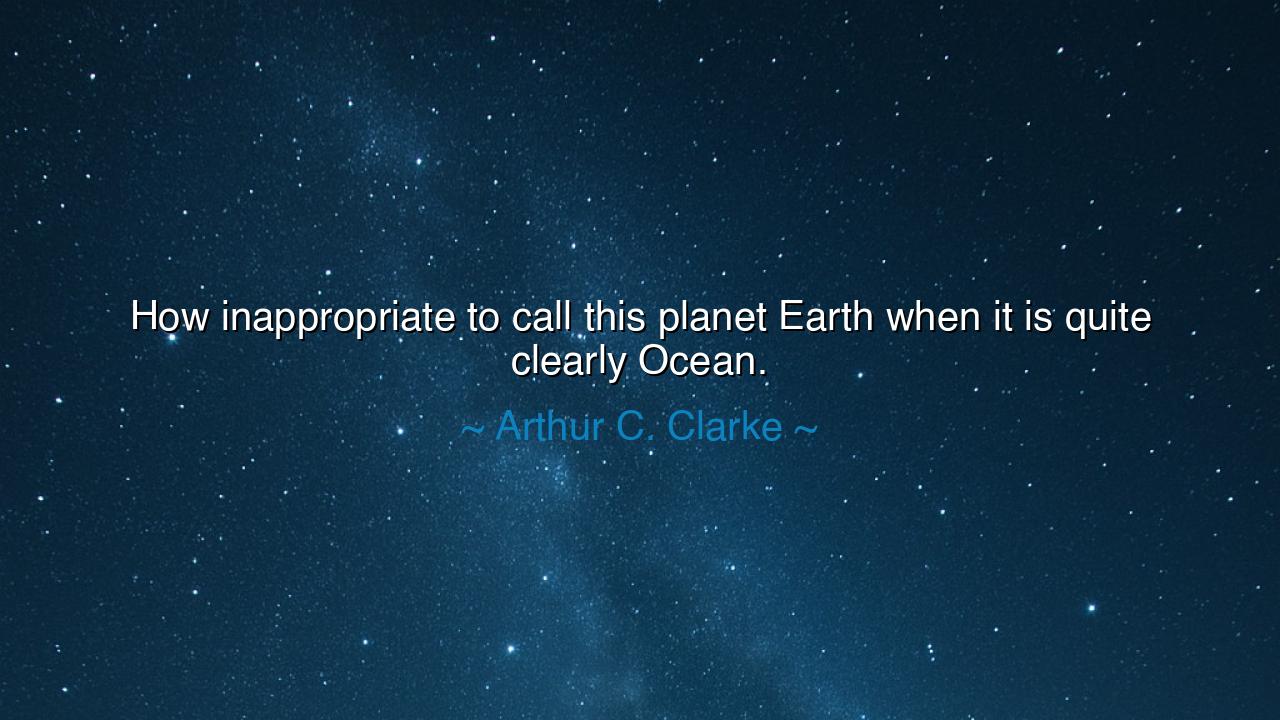
How inappropriate to call this planet Earth when it is quite






Hear the vision of Arthur C. Clarke, dreamer of stars and prophet of the future, who declared: “How inappropriate to call this planet Earth when it is quite clearly Ocean.” In this sentence, he strikes at the very heart of our perception, reminding us that what we take for granted may blind us to truth. We call our world by the name of soil, yet most of its body is water. The seas cover its face, the tides shape its destiny, the storms of the deep govern its climate and its life. This planet is not chiefly a realm of dust, but a world of waves.
The Ocean is not an ornament to the Earth, but its very essence. It is the womb of life, for from its depths the first creatures rose. It is the sustainer of balance, for it governs the winds and the rains. It is the true monarch of the globe, stretching in vast dominion, swallowing continents in its embrace. Clarke, a man of science and imagination, saw this clearly: to name the world after its soil is to forget its soul. The true face of our planet is not brown, but blue.
The ancients, too, revered this truth. The Greeks spoke of Poseidon, lord of the sea, whose wrath could shake kingdoms. The Polynesians saw the Ocean not as barrier but as pathway, cradling their voyaging canoes across distances that seemed infinite. Even the Hebrews, in their scriptures, saw the waters as the primal element, over which the Spirit of God moved before creation. In every age, man has looked to the sea and known that it is both mystery and master.
History confirms it. Consider the voyages of Magellan, who circled the globe not by trudging across land, but by sailing upon the endless expanse of Ocean. His journey proved not only that the world was round, but that it was vast and blue, stitched together by waters that no empire could tame. Later, the power of Britain arose not from its fields but from its fleets, for he who commands the Ocean commands the world. The naming of our planet as “Earth” betrays this truth, for the soil is scattered, but the waters are one.
The meaning of Clarke’s words is more than scientific; it is spiritual. He reminds us to see what is before our eyes and to name it truly. We cling to soil because we live upon it, but we forget that it is the sea that binds us, nourishes us, and humbles us. The Ocean is the mirror of eternity: vast, unfathomable, alive with power. To ignore it is to misunderstand not only the planet, but our place within it.
The lesson is thus: live with reverence for the waters, for they are the true face of this world. Guard them against pollution, cherish them as sources of life, respect them as forces greater than empires. Do not walk in arrogance upon the land, forgetting that the land itself is sustained by the sea. To honor the Ocean is to honor the Earth rightly, seeing it not as dust alone but as the living blue jewel it truly is.
What, then, are the practical actions? Protect the rivers and lakes that feed the seas. Reduce the poisons we cast into the waters. Learn the stories of the Ocean, and teach them to your children, so they will not forget that their home is more wave than soil. Sail, swim, or walk upon its shores with reverence, remembering that you stand at the edge of the greatest temple. And when you speak of this planet, remember Clarke’s reminder: we live not on Earth alone, but on Ocean.
Thus, the words of Clarke are more than clever—they are a summons to wisdom. “How inappropriate to call this planet Earth when it is quite clearly Ocean.” Call it rightly, O seeker, and you will live more humbly, more gratefully, more truthfully. For to see the sea is to see the heart of the world, and to revere it is to walk in harmony with creation itself.






AAdministratorAdministrator
Welcome, honored guests. Please leave a comment, we will respond soon